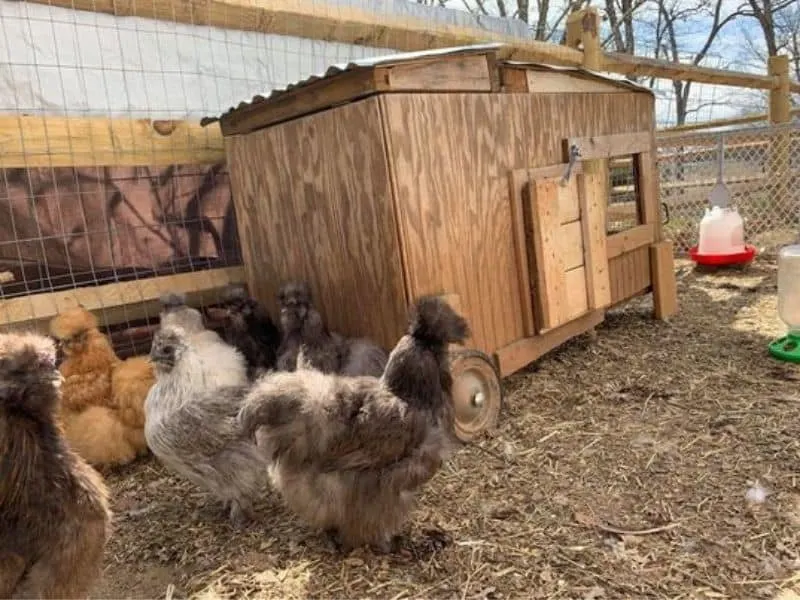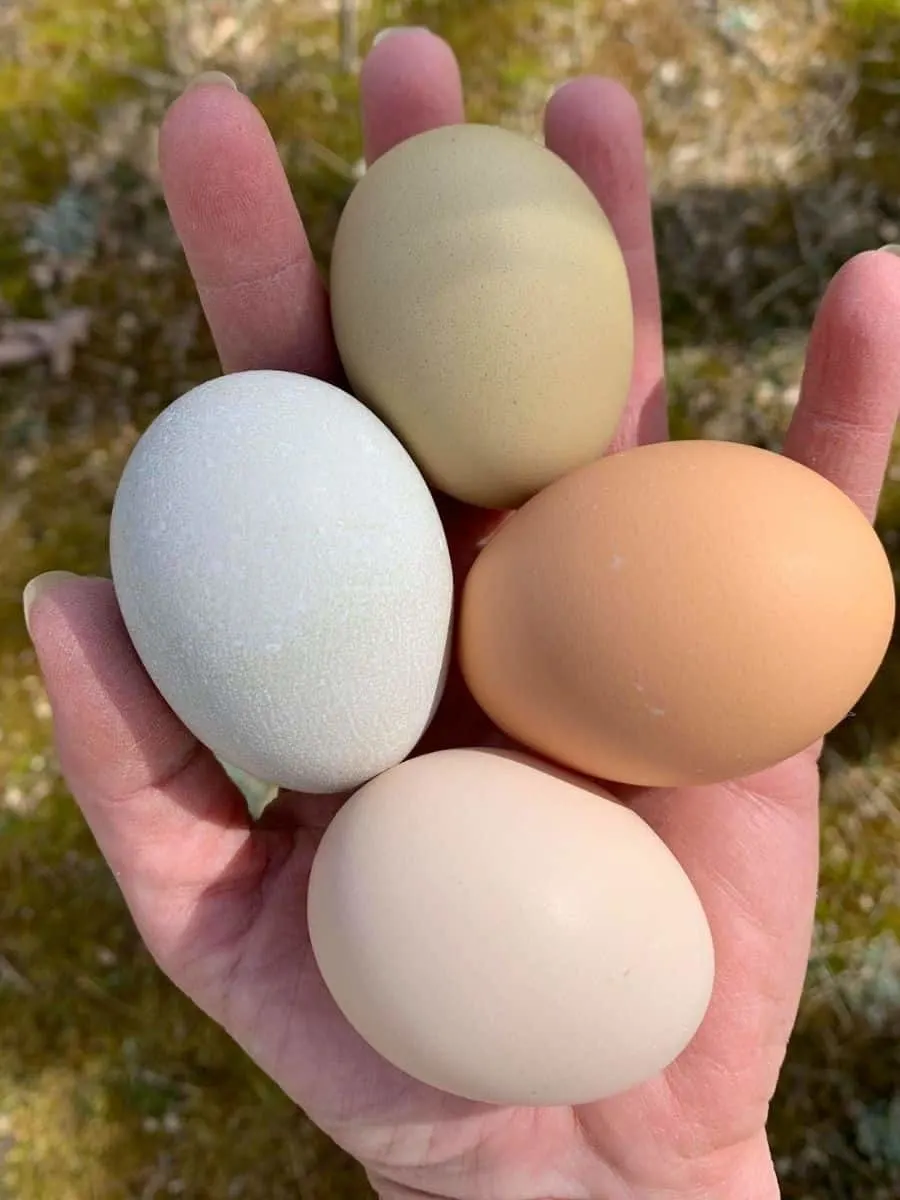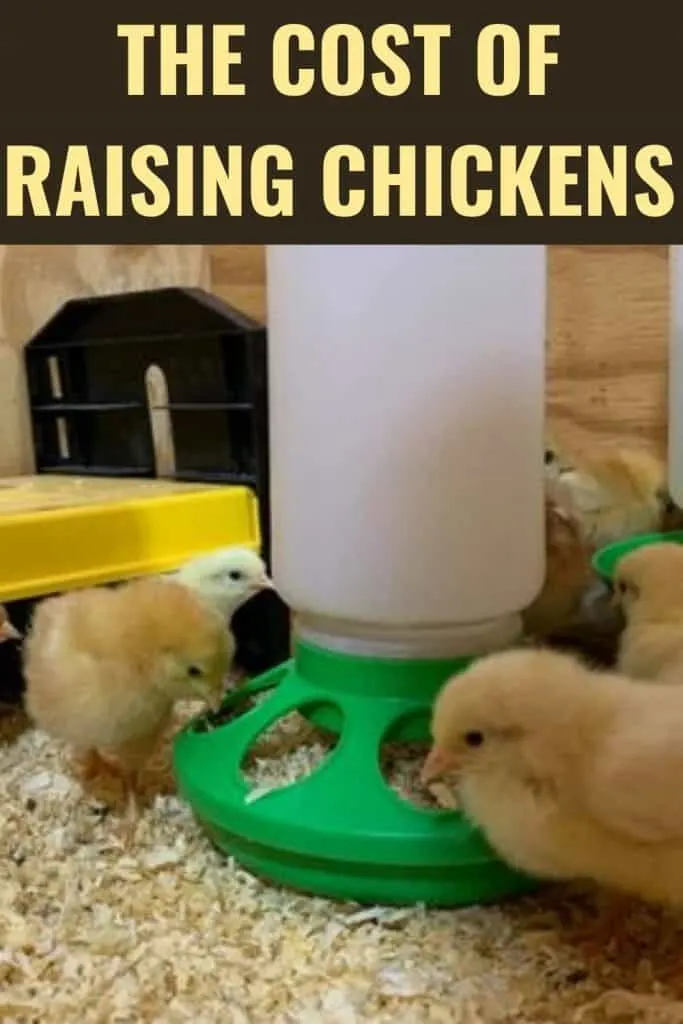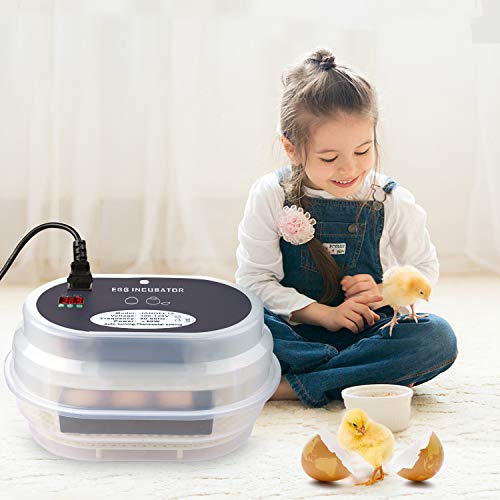So you made the decision to raise some backyard chickens. The cost of raising chickens can be daunting for some, but it doesn’t have to be. Here’s what to expect money-wise when raising a small backyard flock.

The cost of raising chickens
Initial set up
If you plan to start out by raising chicks you’ll need to have a brooding area set up before you bring them home.
- A brooder can simply be a 50-gallon plastic tub from your local box store. They come with a lid and will run between $15-$19 dollars. The lid comes in handy for when the chicks grow and become big enough to jump out of the box. The lid can be modified with a wire cover to prevent this. It will also prevent a curious cat or dog from getting into the brooder.
- You will also need a feeder and a waterer. These can be purchased at your local feed store for around $12-$15 for the pair. Or, get this set from Amazon.
- You will need bedding to put down in the brooder to absorb waste and give them a comfortable place to sleep and move around on. Pine shavings are the most popular form of bedding material and run around $7 a bag for 8 CF.
- The most important element of brooding chicks is the heat source. There are two different items you can purchase to provide heat for your birds. The first is a traditional heat lamp. A heat lamp consists of a metal housing with a 250-watt heat bulb. This method will run you around $16-$20. I personally Do Not Recommend a heat lamp as it can be a fire hazard. The second option is a heat plate. This is the safer and, in my opinion, better option to use. A heat plate uses radiant heat to warm the chicks, much like a mother hen would. It is a more expensive option at $40, but well worth the investment for the safety of your birds and home and for your peace of mind.
- For your initial set up you are looking at around $100.
Graduating to the great outdoors

Once your chicks reach 8-10 weeks of age they will be old enough to transition permanently to their outdoor housing. The cost of a chicken coop and run varies greatly depending on size, type, and whether you can build it yourself or you chose to buy a pre-fab coop.
If you choose to buy a coop that is already made, keep in mind that the materials used in most of your pre-fab coops are not as long-lasting as those of a homemade coop. The wood is usually softwood and the latches and hardware are typically flimsy and ineffective against predators.
Many folks who buy pre-fab will modify some of these issues themselves, such as beefing up the hardware and painting the wood with a weatherproof sealer. This will help to expand the life of a pre-fab coop. Most of these types of coops come with an attached run which is usually quite small.
Depending on how many birds you have the prices can vary from $250 (which will comfortably house three chickens) to $1,200 (houses 10-12).
If you or someone in your family is handy with tools and has a knack for building you could build your own coop and run.
Many folks will source free materials from their community such as pallets, scrap wood, and metal, or reuse an existing structure on their property such as an old shed or storage building.
When building your own, the cost can vary greatly depending on what materials you already have, what you may need to buy, and how much work you can do yourself. My husband and I built a 12’x4’ coop out of wood siding and two-by-fours or around $800. It houses 50-60 chickens comfortably.
They also have a 2000 SF run where they spend the majority of their time. The run consists of 5’ tall welded wire livestock fencing and t posts. The run cost around $300. We did all of the work ourselves so no labor costs were involved. My setup has been in place for over seven years and is still holding up well.
Unexpected costs and emergencies
There will be times when your chicken(s) may fall ill or get injured and you’ll have to decide how you want to take care of the situation. A poultry vet can be hard to find and if you do find one, it’s rather expensive.
Doctoring your chickens yourself can save you money and with a little knowledge, you can remedy most situations.
Having a well-stocked chicken first aid kit can be a life-saver (literally) in times of sickness or injury. For around $100 you can purchase the most common items to have on hand. Some of these items include, but are not limited to:
- broad-spectrum antibiotic (most likely requires a veterinary prescription)
- probiotic powder
- rooster booster or Nutri drench (available at Tractor Supply, or from Amazon)
- dewormer
- insecticide
- neosporin (without the pain relief)
- gauze pads
- vet wrap
- rubbing alcohol
- hydrogen peroxide
- preparation H
- Vet RX
Money-saving tips

While raising chickens will require a continuous financial commitment there are ways you can recoup some, if not all, of your monthly expenses. By selling eggs you may be able to supplement your feed costs and reduce the amount you spend out of pocket each month.
Also, if you have a rooster you can sell fertilized eggs for hatching. Hatching eggs typically sell for more than eating eggs.
You could also hatch out chicks from your flock with a broody hen or in an incubator and sell those. These three examples are just a few ways to cut down on costs.
Other ways to cut down on costs:
- Feed your birds all of your kitchen scraps … chickens can, and will, eat almost anything. They are omnivores like we are and appreciate meat scraps as well as fruits and vegetables.
- Rake up freshly mown grass clippings and toss them in the pen. You can also gather weeds such as chickweed and hen pick and throw those in for your birds to eat.
- If you can free-range at all, your birds will fill up on bugs and greenery that will reduce their feed consumption.
Raising chickens is fun and rewarding. With a bit of research and budget planning, you should be able to comfortably keep your feathered friends housed, healthy and happy for years to come.
FAQ
How much does it cost to raise a chicken per year?
It depends. If you have a large flock, it will cost less than if you have one lonely chicken (please get at least 3: chickens need companions for a pleasant social life)
It also depends on if your chickens are free-ranging or stay in their run all the time. And, of course, if you like to give them treats (and who doesn’t?), that will add to your cost as well.
All that being said, it costs somewhere around 15 and 50 cents a day for a chicken, which makes it between $54 and $182 a year for one chicken. That is, of course, the cost of food. You’ll need to consider all the other expenses of raising chickens: the coop, bedding, accessories, medicine, etd.
Is it cheaper to buy eggs or raise chickens?
Again, it depends. In the first year, your eggs will be very expensive, but as time goes on, your expenses will be a lot lower and eggs will be less expensive than at the store. And, of course, they are fresh and visually appealing (if you buy different breeds of chickens).
How many hens do I need to get a dozen eggs a day?
In order to get a dozen eggs a day, you’ll need 13 to 16 hens, depending on the breed you have. Some chickens, such as golden comets can lay up to 320 eggs a year (that means most days), while others will lay 2 to 4 eggs a week.
Also, in the winter, they may stop laying or lay a lot less.
How many chickens do you need to get a dozen eggs a week?
Three to four chickens will give you a dozen eggs a week.
What is the best thing to feed chickens for eggs?
They need layer feed (which contains everything they need in their diet for making eggs), greens, mealworms, and a source of calcium such as eggshells and/or oyster shells.




Quick Guide To Raising Backyard Chickens
Thursday 28th of July 2022
[…] The Cost Of Raising Chickens – What To Expect When Raising Your Flock […]
9 Chicken Coop Must Haves - The Basics And More
Thursday 18th of March 2021
[…] Many of these chicken coop must haves can be free, but some will need a little investment. Learn more about the cost of raising chickens. […]